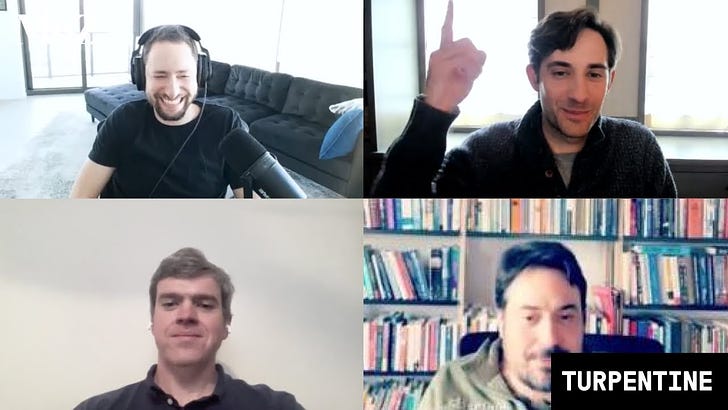SVB Explained w/ Byrne Hobart, Effective Accelerationism and the AI Safety Debate
A new MoZ episode is out today ft Byrne Hobart talking about SVB. Also: a recap of e/acc from last week's episode.
Hey MOZarts,
Great news. Antonio is back for today’s episode with
where we talk SVB and how to solve finance.BTW, last week MoZ got
’s stamp of approval.

Today we’ll cover:
Some links referenced in our newest episode with
e/acc concepts from Ep 12 w/ Based Beff Jezos and Bayeslord:
Equanimity in the face of the singularity
Adversarial equilibrium
The opportunity cost of deceleration & doomerism
Youtube comment roundup
Newest episode just dropped with Byrne Hobart.
Timestamps
1:28 Dan’s story with SVB
6:00 Byrne in the groupchat (Check out Thediff.co)
7:00 How Byrne identified SVB’s insolvency
15:30 How banking works
22:10 Fractional reserve banking
27:00 Banking on-chain
32:00 Understanding illiquidity
46:00 Housing market
53:00 How much can crypto recreate the financial system?
1:08:00 Crypto is financial system for digital native world
1:15:25 Are we at the end of (financial) history?
1:20:00 Finance is never solved|
References mentioned:
Byrne’s article on SVB | Matt Levine (AGMs recommendation) | Margin Call (Dan’s watched this ten times) | Mark-to-market accounting | Papillon the movie and the autobiography by Henry Charrière upon which its based | Prix Goncourt Prize (drink!)


Concepts from last week’s episode with Based Beff Jezos and Bayeslord:
Equanimity in the face of the singularity
Bayeslord discusses the importance of having a mindset of higher variance in the face of the singularity. This idea is related to the psychological thesis of Jack, which appears to emphasize the need for equanimity in the face of rapid change. He contrasts this mindset with the fear and clinging to the status quo that has been pervasive in culture for the past 20 years, leading to an increasing amygdala hijack. The idea of equanimity in the face of change is reminiscent of Buddhist philosophy, and he suggests that cultivating this mindset within oneself can lead to greater happiness. He argues for the importance of embracing change and uncertainty rather than resisting it and suggests that doing so can lead to a more positive outlook and greater personal fulfillment.
Adversarial Equilibrium
In last week’s episode, we highlighted the dangers of centralized control in Western AI. Beff Jezoz argued that compromising the control node of centralized AI could lead to the capture of its power, thereby taking control of it. He believes that a high variance landscape of many millions of neural nets run by a collective of groups or DAOs would be more fault tolerant to corruption, making it harder to co-opt or take over. This anti-fragile system is why bottom-up capitalism tends to win against communism. The potential dangers of centralized control could compromise AI systems, leading to the dissemination of biased information. Therefore, maintaining an open-source culture and decentralized knowledge is crucial to maintaining a healthy marketplace of AI and an adversarial equilibrium.
Further, effective accelerationism should be biased towards maintaining this equilibrium by open-sourcing models, keeping a healthy developer economy, and not centralizing the computer, algorithms, or knowledge in AI. Maintaining an adversarial equilibrium is only possible if there is no monopoly on intelligence — this requires fighting against the monopolization of intelligence and embracing variance in AI development. The importance of maintaining an adversarial equilibrium in AI cannot be overstated, as it will determine the ethical use and safety of AI technology in the future.
Doomerism has an unpriced opportunity cost of upside
There is an unpriced opportunity cost of upside in deceleration and doomerism, which is the belief that the future is bleak and that society is heading towards inevitable collapse. If a company has a small chance of going to zero or a larger chance of exploding in value, investors would still invest in it. Similarly, investing in advancing civilization and leveraging new technologies, including AI, could have significant benefits that outweigh the potential risks. Beff is bullish on civilization co-evolving with technology and unlocking new possibilities for growth, quality of life, and understanding and controlling the world around us. The unpriced opportunity cost of doomerism is the potential upside that could be missed out on if we give up on advancing civilization due to a pessimistic outlook. He advocates for going faster towards a better future and not underestimating the potential benefits of embracing technology and advancing civilization.
If you missed E12, watch it below.
Moment of Zen is supported by: Secureframe
Secureframe is the leading all-in-one platform for security and privacy compliance. Get SOC 2 audit-ready in weeks, not months. Sign up for a free demo and mention “Moment of Zen” during your demo to get 20% off your first year.
Highlighting Youtube Comments
The Good
The Be Better
The Funny
We only know Antonio because of this show, not his book or company.
Until next time.
Moment of Zen is still evolving and we want to know what is most valuable to you. What do you want us to talk about or share in this newsletter? Leave us a note in the comments.








